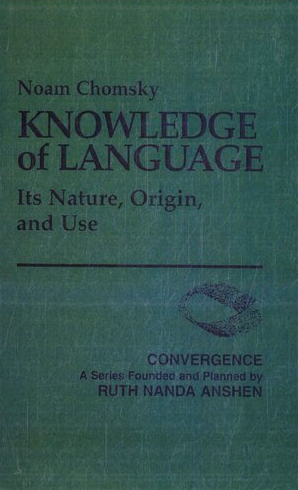Newly released
This book is new and will be uploaded as soon as it becomes available to us and if we secure the necessary publishing rights.

Language and Problems of Knowledge
(0)
Author:
Noam ChomskyNumber Of Reads:
76
Language:
English
Category:
Social sciencesSection:
Pages:
358
Quality:
good
Views:
850
Quate
Review
Save
Share
Book Description
Language and Problems of Knowledge: The Managua Lectures
Language and Problems of Knowledge is Noam Chomsky's most accessible statement on the nature, origins, and current concerns of the field of linguistics. He frames the lectures with four fundamental questions: What do we know when we are able to speak and understand a language? How is this knowledge acquired? How do we use this knowledge? What are the physical mechanisms involved in the representation, acquisition, and use of this knowledge? Starting from basic concepts, Chomsky sketches the present state of our answers to these questions and offers prospects for future research. Much of the discussion revolves around our understanding of basic human nature (that we are unique in being able to produce a rich, highly articulated, and complex language on the basis of quite rudimentary data), and it is here that Chomsky's ideas on language relate to his ideas on politics.The initial versions of these lectures were given at the Universidad Centroamericana in Managua, Nicaragua, in March 1986. A parallel set of lectures on contemporary political issues given at the same time has been published by South End Press under the title On Power and Ideology: The Managua Lectures.Language and Problems of Knowledge is sixteenth in the series Current Studies in Linguistics, edited by Jay Keyser.
Noam Chomsky
Fram Noam Chomsky (born December 7, 1928 Philadelphia, Pennsylvania) is an American professor of linguist and philosopher, as well as cognitive scientist, logician, historian, critic, and political activist. He is Professor Emeritus of Linguistics in the Department of Linguistics and Philosophy at MIT, where he has worked for more than 50 years. In addition to his work in linguistics, Chomsky has written on war, politics, and the media and is the author of more than 100 books. According to the 1992 Art and Human Sciences Reference List, Chomsky was cited more than any living scholar from 1980 to 1992, and ranked as the eighth most cited reference ever in a list that includes the Bible, Karl Marx, and others. Chomsky has been described as a cultural preeminent, having been voted as the "world's leading intellectual" in a 2005 poll. Chomsky is also described as the "father of modern linguistics" and is considered a major figure in analytic philosophy. His work has influenced fields such as computer science, mathematics, and psychology. . He is also credited with establishing the theory of generative grammar, which is often considered the most important contribution to the field of theoretical linguistics in the twentieth century. He is also credited with establishing what became known as the Chomsky hierarchy, the theory of universal grammar, and the Chomsky-Schützenberger theory. After the publication of his first book on linguistics, Chomsky became a prominent critic of the Vietnam War and has since continued to publish his critical books on politics. He is best known for his criticism of US foreign policy, state capitalism, and the general news media. His criticism of the media, which he co-wrote with Edward Hermann, is included in The Deference Industry: The Political Economy of Mass Media (1988) is an analysis that crystallizes a theory of the propaganda model for the study of media. Chomsky describes his views as "fairly anarcho-traditionalism with its origins in the Enlightenment and classical liberalism" sometimes identified with anarcho-syndicalism and libertarian socialism. He is also considered a key theoretician of the left wing of American politics. He is also credited with establishing what became known as Chomsky's hierarchy, a classification of formal languages according to their generative capacity. In addition to his work in linguistics, Chomsky is widely known as a political activist, and for his criticism of the foreign policy of the United States and other governments. Chomsky describes himself as a libertarian socialist, a sympathetic anarchist who is a member of the world's industrial workers' union and is often considered a key theorist of the left wing of American politics. According to the Arts and Humanities Reference Index, between 1980 and 1992 Chomsky was cited as a reference more than any other living person, and as the eighth person ever.
Book Currently Unavailable
This book is currently unavailable for publication. We obtained it under a Creative Commons license, but the author or publisher has not granted permission to publish it.
Rate Now
5 Stars
4 Stars
3 Stars
2 Stars
1 Stars
Quotes
Top Rated
Latest
Quate
Be the first to leave a quote and earn 10 points
instead of 3
Comments
Be the first to leave a comment and earn 5 points
instead of 3